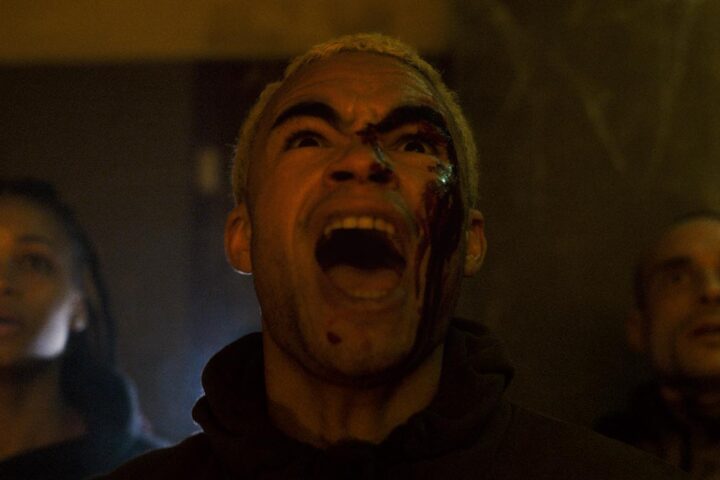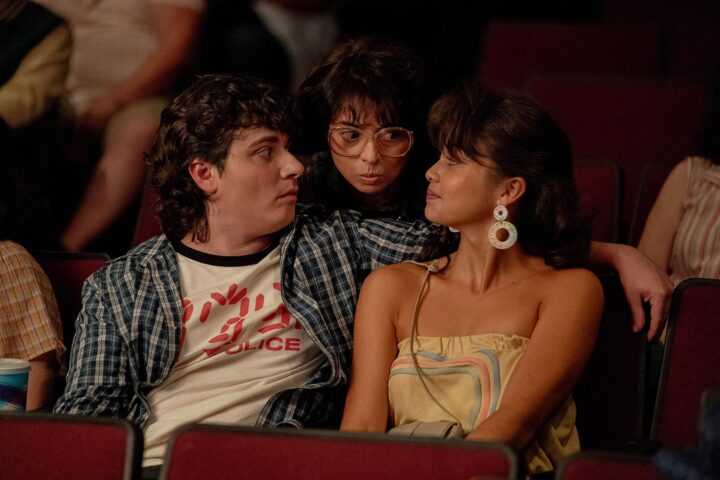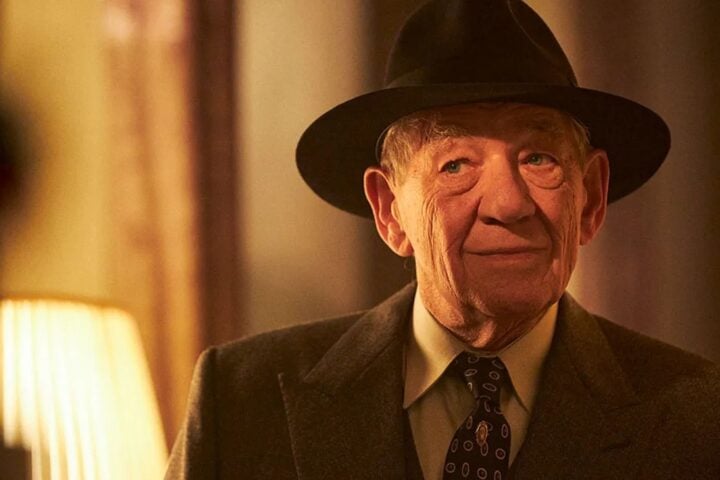In writer-director Jérémy Clapin’s downbeat science-fiction film Meanwhile on Earth, the promises of the future are already the naïve and tarnished daydreams of the past, while the present is a matter of inexorable decline. Lit in wintry tones of disillusionment, nearly every shot in Clapin’s follow-up to I Lost My Body evokes a kind of post-Futurist mood. At the same time, there are flashes of nostalgia for what we thought the present could be—if only we had believed in those daydreams hard enough for them to become reality.
The film tells the story of Elsa (Megan Northam), a young woman whose brother, Franck (voiced by Sébastien Pouderoux), has disappeared into the vacuum of outer space on an exploration mission. Her talent as an illustrator motivates Meanwhile on Earth’s several animated daydreams, in which she meets with Franck on a spacecraft that suggests something out of a Mœbius comic. Her job at a facility providing palliative care for the dying, intended as temporary until she overcomes her grief, has turned into an excuse to put her life on hold.
One windy night, Elsa hears her brother’s voice issuing from an antenna. Franck tells her that he’s being held captive by an otherworldly “they” who can bring him back if she cooperates. He instructs his sister to insert a glowing seed in her ear so that he can speak with her directly. After a fleeting conversation, Franck is drowned out by an extraterrestrial entity (voiced by Dimitri Doré). If Elsa follows a path, the entity says, her brother will be returned.
This path turns out to be an inversion of the trolley problem. Where the philosophical thought experiment asks if we’d be willing to sacrifice one person to save a greater number, Elsa must decide whether to sacrifice seven people to save her brother. Each victim will host one of seven undying beings who make up the “they.” After providing “their” first host inadvertently while defending herself from rape, Elsa takes the bargain. At first, she tries to select victims who, she believes, have nothing to lose. For example, a patient at the facility with advanced dementia and an unhoused alcoholic. If the thought-experiment-made-real doesn’t feel enough like a shoehorned plot device, it comes with a time limit, too, to generate suspense.
Meanwhile on Earth uses this contrivance to explore how the self-absorption of grief and depression can turn outward to hurt others, and how the colonized can abet the colonizer. When Elsa decides to let what would be the fifth victim go unscathed, the film’s stance on whether a family member’s life is more valuable than that of a stranger becomes clear, even if that stranger is no longer a stranger in the abstract, having shared with her his dream to start a restaurant.
That’s interesting enough, but the film’s abrupt ending is liable to leave you feeling cheated. As Elsa drives out of a tunnel into a clean sunlight, then walks to the ocean’s edge, Clapin suggests that she’s emerged from her depression. Offshore, the blur of a ship or spacecraft can just be made out. All well and good, except that she’s still responsible for (at least) four deaths, only one of which was in self-defense. The dire moral and psychological consequences of her taking the bargain and then failing to fulfill it are evidently beyond the film’s scope.
To make sense of Elsa’s implausibly abrupt recuperation, one could hazard any number of readings, but most would hinge on disregarding much of what transpires on screen. Meanwhile on Earth is so closely welded to Elsa’s subjectivity that it could be seen as imagined, maybe played out in the safety of her sketchbook, or as a schizophrenic episode. But if Elsa didn’t really sacrifice anyone, and it was all “just a dream,” then her non-actions have no consequences in the world around her, and she has no agency as a character.
Unless, perhaps, the film is an allegory for the so-called bargaining stage of grief, a mourning for the death of a brighter future. If so, that hardly saves the overbearing plot of Meanwhile on Earth from, sadly, obscuring the humanity of its characters, or from letting down its palpable mood, the beauty of its cinematography, and its meditations on power.
Since 2001, we've brought you uncompromising, candid takes on the world of film, music, television, video games, theater, and more. Independently owned and operated publications like Slant have been hit hard in recent years, but we’re committed to keeping our content free and accessible—meaning no paywalls or fees.
If you like what we do, please consider subscribing to our Patreon or making a donation.






Perhaps she sacrifices herself at the very end, and we’re just experiencing her dream of being able to live without her brother. What about the little pendant in the shape of the planet Saturn that swings in the rear-view mirror throughout the film and magically disappears during the liberating shot of the tunnel exit?